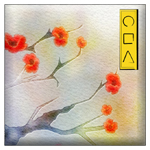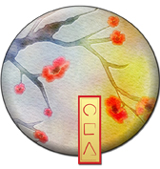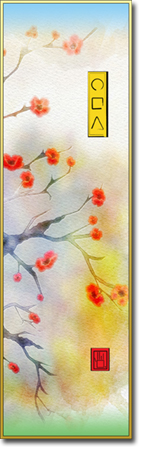On The Way: The Daily Zen Journal
Treasury of the Eye of True Teaching
Dahui (1089-1163)
Mazu said,

You should each believe your own mind is Buddha. This mind itself is Buddha. The great teacher Bodhidharma came to China from South India, transmitting the supreme vehicle’s teaching of one mind, to get you to wake up.
He also cited the Lankavatara Sutra to seal people’s mind ground, lest in your confusion you fail to believe for yourself that each of you has the reality of one mind.
So the Lankavatara Sutra has Buddha’s talks on mind as its source; the method of denial is the method of teaching. Those who seek the teaching should not be seeking anything—there is no separate Buddha outside of mind, no separate mind apart from Buddha.
One does not grasp the good or reject the bad; one does not stick to either extreme of purity or defilement. Realizing the intrinsic emptiness of sin, thought after thought cannot be grasped, having no intrinsic essence.
So the world is only mind; myriad forms are stamped by a single truth. Whatever form you see, you are seeing mind. Mind is not mind of itself; it is there because of form. Just speak in accord with the time, in fact and in principle, and there will be no hindrance at all.
Enlightenment, the result of the Path, is also like this. Whatever is produced in the mind is called form; since you realize form is empty, therefore production is unproduced. If you comprehend the meaning of this, then you can dress and eat according to the season, developing the embryo of sagehood, spending the time according to events. What further concern is there?

If you accept my teaching, listen to my verse:
The mind ground is explained according to the time
And enlightenment too is simply peace;
Free from obstruction, concrete or abstract,
Creation itself does not create.
A monk asked, “How does one cultivate the Way?”

The Master Dahui said, “The Way is not in the province of cultivation. If you speak of attainment by cultivation, whatever is developed by cultivation also decays. Thus you are the same as a disciple. But if you say that means no cultivation you are the same as an ordinary person.”
The monk also asked, “By what understanding can one attain the Way?”
Master Dahui said, “Your own nature is originally complete; just do not linger over good and bad things, and you can be called a practitioner of the Path. To grasp good and reject bad, contemplate emptiness and enter concentration, is all in the province of contrived effort. If you then seek outwardly, you will become further estranged, increasingly remote.
“Just end mental calculation of the world. A single moment of thought is the root of birth and death in the world. Just don’t have a thought, and you remove the root of birth and death. Then you gain the supreme treasury of truth.
“For countless eons, people’s illusions, doubts and distortions, falsehoods, egoism, and pride have combined into one mass. Therefore scripture says this body consists of a conglomeration of elements. When it comes into being, it is only elements becoming active, when it passes away, it is only elements becoming quiescent.

“When these elements become active, they don’t say, ‘We are active,’ and when they become quiescent, they don’t say, ‘We become quiescent.’ When preceding thought, succeeding thought, and intervening thought do not await each other, passing away into quiescence moment to moment, this is called oceanic concentration. It takes in all things, just as a hundred thousand different streams return to the ocean, all to become ocean water.
“Maintaining a single flavor while containing all flavors, dwelling in the ocean you merge myriad streams, like someone bathing in the ocean, using all the waters.
“Therefore, disciples understand confusion, while ordinary people confuse understanding. Disciples do not know that the mind of sages basically has no stages or ranks, cause or result, or conceptions of gradation; cultivating causes to realize results on the basis of false ideas, they dwell in empty concentration for tens of thousands of eons.
“Even though they are already awakened, having awakened, they revert to confusion. The enlightened beings look upon this as like the pains of hell, failing to see Buddha-nature because of sinking into voidness and stagnating in quiescence.”
Dahui (1089-1163)





“Help me, master. Who is the man who does not accompany the ten thousand dharmas?” Layman P’ang asked Mat-su before his great enlightenment.
Mat-su replied, “Wait till you’ve swallowed in one swig all the water of the West River, then I’ll tell you.”
Some of the teachers from our ancient past can sound as puzzling as the above response of Mat-su. However, the Layman P’ang suddenly understood the Mysterious Principle with these words.
Wherever we find ourselves along the Way we can always find a handhold in these writings, however meager it may seem. No one can say what phrase, which practice, what sound in Nature may cause a sudden awakening which is in reality, just a beginning.
There is a common theme throughout the teachings we refer to as the Way with many styles of expression. Some of the teachers are working with monks, some with lay people, which accounts for the differing styles, and a few did not write down their teachings at all.
Find that one phrase or sentence in each reading that beckons to you and stay with it awhile. It would be rare to get to the depths of a reading with only a single visit.
“You should each believe your own mind is Buddha.”
Your Friend along the Way,
Elana, Scribe for Daily Zen